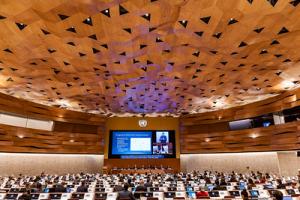
Halfway to 2030, the future we want seems to be still well out of reach. The 2023 SDG progress report for the UNECE Region, which informed discussions at the inclusive and 1000-strong Regional Forum on Sustainable Development held last week, showed that despite some bright spots, we face a troubled picture of regression and insufficient progress.
Countries of the Pan-European region and North America – which host 16% of the world’s population and account for 41.4% of the world’s GDP at purchasing power parity, and approximately 83% of total Official Development Assistance – are on track to achieve only 21 targets of the Sustainable Development Goals (18 per cent of the 115 measurable targets) by 2030. This is down from 26 targets assessed as being on track last year. For 79 targets (up from 64 last year), progress must accelerate if the target is to be met, while for 15 targets (as last year), the current trend needs to be reversed.
The 2030 Agenda was designed to lead us on a path towards a better world. But right now, the world, and our region, is in many ways worse off than it was back in 2015. What’s more, our region is now further away from meeting the SDGs than it was a year ago. With the impact of the war in Ukraine not yet reflected in available data, next year’s measurements are bound to be even worse.
As we look ahead to the SDG Summit in September, which will be a make-or-break moment for the implementation of the 2030 Agenda, we need to ensure solid commitments to rescue the SDGs, as the Secretary General has said.
But right now is not a time to despair at the lack of progress or just point out the problems we face. The message of the 2030 Agenda is ultimately one of hope, of confidence in our collective ability to deliver a better future for all.
The SDGs (Goals 6 on water, 7 on energy, 9 on infrastructure, innovation and industry, 11 on cities, and 17 on partnerships) under in-depth review this year at the Regional Forum and the High Level Political Forum in July – cover policy areas in which UNECE is deeply engaged, and where, despite challenges, we can identify some positive trajectories.
For water (SDG 6) for example, globally, more than 3 billion people depend on water that crosses national borders, and we are witnessing strong traction for transboundary water cooperation as a crucial foundation for peace, sustainable development and climate action, harnessing the UN Water Convention. At the recent UN Water Conference, Nigeria and Iraq became the latest parties to join the Convention, while some 10 countries committed to do the same. This unique instrument has already proven its value for supporting joint action in Europe over the last 30 years, where it continues to support concrete measures today.
And for infrastructure, innovation and industry (SDG 9), for example, climate action in the transport sector – which represents almost 23% of global energy-related CO2 emissions – is a key area where member States are seizing the international regulatory framework developed at the UNECE Inland Transport Committee to push forward changes on the ground. These range from UN regulations to enable the widespread introduction of electric vehicles, to cooperation for electric vehicle charging, and active mobility policy and adaptation of transport infrastructure to climate change impacts.
This is also one area where digital technologies are opening significant new perspectives. But this potential stretches right across the board for sustainable development and for UNECE’s related tools - for natural resource management, the decarbonization of the energy sector, for trade facilitation, and the reshaping of urban services and the built environment.
To collectively make the most of these opportunities, UNECE member States will convene on 18-19 April for the 70th session of the UN Economic Commission for Europe – the highest institutional body of our organization – under the main theme of Digital and Green Transformations for Sustainable Development. I count on governments, together with young people from across our region following UNECE’s first ever Youth Dialogue in December 2022, to challenge us with new insights and impulses for our vital work in these areas.
This will be crucial to help us best harness UNECE’s 75 years of multilateral cooperation on regulatory and policy instruments, as together we act to make the Commission fit for the great sustainable development challenges we face today, for the vision of the 2030 Agenda, and beyond.

